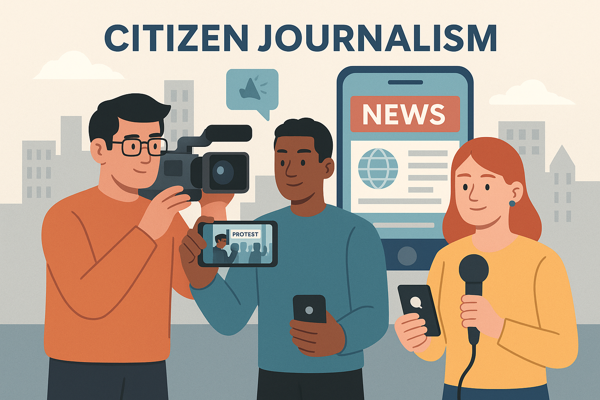Citizen Journalism: Empowering Individuals to Shape the Narrative
In an age where nearly everyone carries a smartphone and has access to the internet, the role of news reporting is no longer limited to professional journalists. A new wave of media creators — everyday people with a camera, a voice, and a desire to tell the truth — is shaping the way we see the world. This movement is called citizen journalism, and it is empowering individuals everywhere to inform, engage, and influence public opinion like never before.
What Is Citizen Journalism?
Citizen journalism refers to the act of regular individuals reporting news and sharing information through digital platforms. These people might record a protest, tweet breaking news, publish blog posts about local issues, or stream live video from the scene of an event.
Unlike traditional journalism, which often involves trained professionals working in newsrooms, citizen journalism is driven by ordinary people — students, parents, workers — who witness something important and want to share it.
The Rise of Citizen Journalism
The growth of citizen journalism has been fueled by several factors:
- Smartphones and internet access have turned nearly everyone into a potential reporter.
- Social media platforms like X (formerly Twitter), YouTube, TikTok, and Facebook provide instant, global reach.
- Declining trust in mainstream media has pushed many to seek out firsthand perspectives.
Major world events — from political protests to natural disasters — are now often first reported by people on the ground, not by news organizations. In many cases, these citizen reports have gone viral, sparking public reactions and even policy changes.
Advantages of Citizen Journalism
Citizen journalism has opened doors to more diverse and democratic news coverage. Its benefits include:
1. Speed and Access
Citizen journalists are often the first on the scene. Their quick reporting can alert the public to urgent issues before official news sources respond.
2. Authenticity and Raw Footage
Unlike polished news segments, citizen journalism often shows raw, unfiltered reality — which can feel more honest and relatable.
3. Coverage of Underreported Topics
Traditional media may overlook certain communities or stories. Citizen journalists can spotlight local issues, social injustices, or voices that aren’t normally heard.
4. Public Engagement
By inviting the audience to contribute and respond, citizen journalism encourages more participation in civic life.
Challenges and Concerns
While citizen journalism offers many strengths, it also comes with limitations:
- Accuracy and Verification: Without proper training, citizen reporters may spread misinformation, even unintentionally.
- Bias and Perspective: Reports may reflect personal opinions rather than balanced facts.
- Legal Risks: Filming in certain locations or publishing sensitive information can lead to legal consequences.
- Safety: Covering protests, disasters, or conflict zones can be dangerous for untrained individuals.
This is why media literacy — the ability to analyze and evaluate information — is more important than ever.
Citizen Journalism vs. Professional Journalism
Citizen journalism isn’t meant to replace traditional reporting. Instead, it complements it.
Professional journalists bring investigative skills, editorial standards, and deep context. Citizen journalists bring speed, access, and local insight. When combined, they can create a more complete and inclusive picture of the world.
In fact, many newsrooms now use citizen-generated content, verifying it and incorporating it into their reports.
Tools for the Modern Citizen Journalist
For those interested in contributing to citizen journalism, there are many accessible tools:
- Smartphones with good cameras and editing apps.
- Social media platforms to publish and share stories.
- Blogging sites like Medium or Substack.
- Live-streaming tools such as Instagram Live or Facebook Live.
- Fact-checking websites to verify information before sharing.
Learning basic journalism ethics — like fairness, accuracy, and respect for privacy — can also help citizen journalists build credibility and impact.
Real-World Impact
Citizen journalism has already proven its power in many situations:
- Political protests: Real-time footage has exposed police violence, shaped international opinions, and inspired global movements.
- Natural disasters: On-the-ground reporting has helped locate missing people and direct aid where it’s needed most.
- Corruption and injustice: Viral videos and posts have triggered official investigations and reforms.
What began as simple posts by individuals have, in many cases, led to big societal changes.
Conclusion: The People’s Press
Citizen journalism is a reminder that storytelling and truth-sharing belong to everyone. When individuals are given the tools and the voice to report on what matters, the narrative becomes richer, more diverse, and more democratic.
In this new era of media, we are not just passive consumers of news — we are active participants. Whether capturing a historic moment or shedding light on a local issue, citizen journalists are changing the world, one post at a time.
You don’t need a press badge to make a difference. You just need your eyes, your voice, and the courage to share what you see.




Post Comment